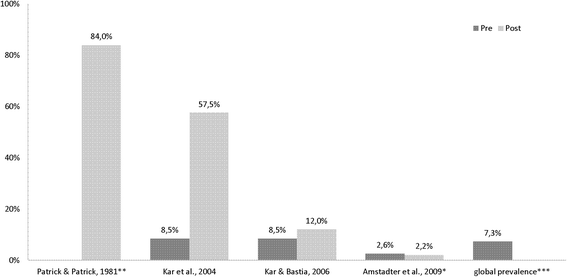Extreme weather events in developing countries and related injuries and mental health disorders - a systematic review
- PMID: 27682833
- PMCID: PMC5041325
- DOI: 10.1186/s12889-016-3692-7
Extreme weather events in developing countries and related injuries and mental health disorders - a systematic review
Abstract
Background: Due to climate change, extreme weather events have an incremental impact on human health. Injuries and mental health disorders are a particular burden of disease, which is broadly investigated in high income countries. Most distressed populations are, however, those in developing countries. Therefore, this study investigates mental and physical health impacts arising from extreme weather events in these populations.
Method: Post-traumatic Stress Disorder (PTSD), injury [primary outcomes], anxiety and depressive disorders [secondary outcomes], caused by weather extremes were systematically analyzed in people of developing countries. A systematic review of observational studies was conducted searching six databases, complemented by hand search, and utilizing two search engines. Review processing was done independently by two reviewers. Prevalence rates were analyzed in a pre/post design; an additional semi-structured search was conducted, to provide reference data for studies not incorporating reference values.
Results: All 17 identified studies (70,842 individuals) indicate a disease increase, compared to the reference data. Increase ranges from 0.7-52.6 % for PTSD, and from 0.3-37.3 % for injury. No studies on droughts and heatwaves were identified. All studies were conducted in South America and Asia.
Conclusion: There is an increased burden of psychological diseases and injury. This finding needs to be incorporated into activities of prevention, preparedness and general health care of those developing countries increasingly experiencing extreme weather events. There is also a gap in research in Africa (in quantity and quality) of studies in this field and a predominant heterogeneity of health assessment tools. PROSPERO registration no.: CRD42014009109.
Figures







References
-
- iDMC. Health & IDPs. 2013; URL: http://www.internal-displacement.org/database/). Accessed: 7 Feb 2014.
-
- IPCC . The regional impact of climate change, extreme weather events: IPCC special reports on climate change. Geneva: Intergovernmental Panel on Climate Change; 2001.
-
- UNDP . Human development report 2011: sustainability and equity: a better future for all. New York: United Nations Development Programme; 2011.
-
- Guzmán JM, Martine G, McGranahan G, Schensul D, Tacoli C. Population dynamics and climate change. London: United Nations Population Fund; 2009.
-
- Zacher W. Klimawandel und Gesundheit: Fakten, Folgen, Forderungen - für Industrie- und Entwicklungsländer. Bonn: Germanwatch; 2011.
LinkOut - more resources
Full Text Sources
Other Literature Sources
Miscellaneous

